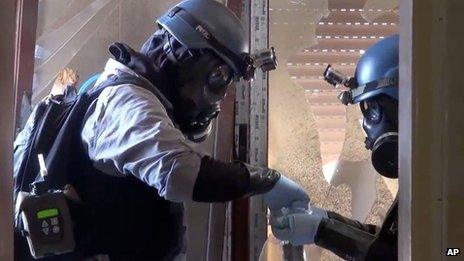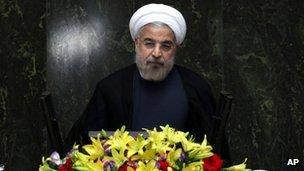Syria crisis: Iran treads fine line on conflict
- Published

Reports of chemical weapons attacks in Syria have brought back terrible memories for Iranians who suffered similar attacks during the Iran-Iraq war
"'Chemical weapons' use in Syria, whoever has done it, is a criminal action and must be condemned. This is Iran's clear and absolute position," Iranian Foreign Affairs Minister Mohammad Javad Zarif wrote on his Facebook page.
However, Iran does not trust the intention of the United States and its allies in launching military action against the Syrian government under the pretext of humanitarian intentions.
"Did all those countries, which make a lot of noise today, have the same position when Saddam Hussein killed many civilians by chemical bombs in [the Iranian town of] Sardasht?" Mr Zarif added on his Facebook wall.
Sardasht, a small town in the Iranian province of West Azerbaijan, was the first place where civilians were attacked with chemical weapons by the then Iraqi President Saddam Hussein during the Iran-Iraq War some 25 years ago.
On 28 June 1987, Iraqi aircrafts dropped mustard gas bombs on Sardasht in two separate attacks on four residential areas.
"Early that morning, the people were gathered at a local shrine," recalled Peyman, a 56-year-old volunteer soldier in the Iran-Iraq war who was in Zardeh village.
"Each plane dropped four bombs, weighing 250kg (550lb) each. The smoke was yellow, green, red, and black.
"One man said it was like a rainbow; another said it was as if the sky was covered in plastic cling film. The birds started dropping off the trees and then the people fell."
He is chemically affected and must come to Sasan hospital in central Tehran for treatment every month.
"Where was [US President] Barack Obama when our children perished in front of our eyes?" Peyman asked, bursting into tears and putting his oxygen mask back on his nose to breathe more easily.
Two hundred and seventy-five people died that morning in a place of worship - many of them women and children. Out of a population of 20,000, some 25% are still suffering severe illnesses from the attacks.
"Whoever did this to innocent people should have the same thing done back to them so they understand," said Peyman's wife.
'Second Vietnam'
This sentiment is common in Iran.

This is the first big test for new Iranian President Hassan Rouhani
Iranians widely regard the United States and its allies with anger and distrust. Chemical weapons remind them of their grievance and losses.
However, the Islamic Republic of Iran, apart from a few predictable warnings, has kept a low profile.
Iran's Supreme Leader Ayatollah Ali Khamenei, in his meeting with the new cabinet, condemned the interference of foreigners in Syrian affairs: "Americans will be the main losers of their military attacks on Syria, like their defeats in Iraq and Afghanistan."
His remarks were immediately echoed by Iranian warlords and commanders.
General Brigadier Mohammad Ali Jafari, the chief commander of the Revolutionary Guards, said: "Although Americans have experienced bitter defeats in Afghanistan and Iraq, they want to complete the domino of their defeats and Syria will be a second Vietnam for them."
Iranians probably believe the White House when it says that the United States does not seek regime change in Syria.
"The options that we are considering are not about regime change," said White House spokesman Jay Carney. "They are about responding to a clear violation of an international standard that prohibits the use of chemical weapons."
Iran believes the United States wants to save face among the international community on the one hand, and to relieve pressure from neo-conservatives and Israel urging it to attack on the other.
"Iran does not want to open more fronts against itself in the world and it is certain that [Syrian President] Bashar al-Assad will not be replaced," political analyst Saeed Leylaz told BBC in Tehran.
"Thus it is not prudent to play more Catholic than the Pope. If Britain and Russia are not able to stop the war, why should Iran?"
After the victory of the moderate Hassan Rouhani in Iran's presidential election, this is the first big test for his government to show a different image to the previous administration team.
Mr Rouhani has promised to ease the lives of Iranians in the first 100 days of his presidency by removing obstacles in the way of Iran's economy. The West has imposed paralysing sanctions on Iran's economy for its disputed nuclear activities.
The new government does not want to add fuel to the fire of its international problems by adopting radical strategies. However, launching military attacks on Syria will sharpen the teeth of hardliners in the country and weaken the moderate policies of the newly-established government.
"The British Parliament rejects military intervention in Syria, as do Iran and Russia," said Saaed Leylaz.
"If the US attacks Syria, the international community will understand that America uses its muscles, not its brain. This is the first time that even Britain does not want to follow America into another war."